The Workers and Employees Program (WEP) of the University of the Philippines College of Law/Law Center conducted a virtual round table discussion (RTD) on Freedom of Association (FOA) on 18 February 2023. This marks the tenth (10th) RTD of WEP since it was established in June 2021.
WEP Program Director Patricia R.P. Salvador Daway opened the RTD. She expressed WEP’s hope that this 10th RTD be a venue for workers and employees to ventilate their most urgent and serious concerns on FOA which effectively prevent them from fully enjoying their right to self-organization. She highlighted that the FOA is a core value that we, as a nation, should protect and uphold, following the examples set by our heroes, who introduced FOA in the Malolos Constitution of 1899, even ahead of the establishment of the International Labor Organization (ILO) by two decades. Despite the specific laws protecting FOA embodied in ILO Conventions, the Philippine Constitution, and Labor Code of the Philippines, numerous complaints on state agents’ interference in union activities continue to persist. In fact, the interferences have become the subject of the recent ILO High-Level Tripartite Mission.
Professor Daway also noted that during the hearing of the House of Representatives Committee on Labor and Employment, the WEP along with the UP Law Institute of Government and Law Reform (IGLR) presented a position paper related to House Bill No. (H.B.) 407 or the Anti-Union Interference Act of 2022 and several other bills on workers’ rights and concerns. They urged the body to tackle the pending bills together with the proposed Revised Labor Code of the UP Law Complex, which has been adopted as House Bill No. 5151, explaining that it would be more efficient in streamlining the issues rather than by pursuing piecemeal amendments. WEP believes, however, that there is an urgent need to prioritize the passage of a special law that will more specifically penalize interferences with workers and workers’ groups and provide for an effective complaint mechanism.
The RTD was attended by resource persons from the Center for Trade Union and Human Rights (CTUHR), the Department of Labor and Employment Bureau of Labor Relations (BLR) and the Office of Representative Arlene Broses of GABRIELA Women’s Party. Representatives from the Bayan Muna Partylist, Ecumenical Institute for Labor Education and Research (EILER), Sentro ng Alternatibong Lingap Panlegal (SALIGAN), National DOH Employees Association (NADEA), Crispin B. Beltran Resource Center (CBBRC), and Institute for Occupational Safety and Health
State of FOA in the Philippines
The first resource speaker was CTUHR Deputy Director Kamz Deligente, who proposed sometime last year that WEP conduct a forum on FOA, considering the numerous reports of alleged interferences on the right of workers to self-organization. She opened by providing statistics from the Bureau of Labor Relations (BLR), which shows that there are 116,175 registered labor organizations, with private sector unions comprising only 1.6 million members out of the 4.8 million membership. She stressed that the number of workers covered by existing collective bargaining agreements (CBA) is small. She noted that simultaneous raids, mass arrests, and union-busting schemes transpired during the pandemic which involved mostly workers and workers’ organizations, citing the cases of Dolefil, First Glory Apparel, and LS Philippines Manufacturing as examples where hundreds of workers were dismissed.
Dep. Director Deligente also raised the problem of red-tagging which is experienced by government employees, teachers, labor rights defenders, and even artists. This issue arises on any platform — on the ground, factories are being entered by the police who directly interfere in union affairs; on social media, union leaders with their faces and names are being posted and are branded as terrorists. Other FOA violations rampant in the country are arrests (see: labor organizer Maoj Maga), enforced disappearances (see: activist Elizabeth “Loi” Magbanua), filing of criminal charges (see: labor union leaders Kara Taggaoa and Larry Valbuena), and murder (see: Bloody Sunday). Ms. Deligente concluded by stating that despite the struggle of Filipino workers in these various attacks, the arrangement of CBAs and workers’ organizations is still ongoing which we shall see as calls to recognize and respect the FOA of workers.
Rights and Remedies of Workers Under Existing Laws
The second resource speaker was BLR Director Atty. Maria Consuelo Bacay, who began by stating that the FOA is a fundamental human right protected under the Universal Declaration of Human Rights (UDHR), the 1987 Philippine Constitution, as well as the Labor Code. The FOA of workers is both a positive and a negative right — it is positive when the government freely lets workers join or organize, and it is negative when the government does not force workers to join, organize, or stay in an organization. In the exercise of FOA, workers have the power to draw up their own constitution and rules, the right to elect their representatives without the interference of the government, the right to autonomy and financial independence, and the right against dissolution or suspension by administrative measures. Previously, the Labor Code provided for administrative cancellation, but with the passage of Republic Act No. 9481, the cancellation of a union registration has been limited to three grounds: first, misrepresentation, false statement, or fraud in connection with the adoption of the constitution and bylaws; second, misrepresentation, false statements, or fraud in connection with the election of officers; and third, voluntary dissolution by the members.
Director Bacay also explained the remedies available that would respond to the needs of workers in exercising their right to FOA. The remedies can be looked at in two ways: legal and administrative. Under the Revised Penal Code, one may file criminal cases for grave threats, arbitrary detention, or delay in the delivery of detained persons. In pursuing this remedy, one will have to undergo the regular criminal procedure of filing a complaint and finding the existence of probable cause before a case is filed in court. Another remedy is found in Republic Act No. 9851 which identifies as other crimes against humanity, the act of persecution against an identifiable group on political grounds. For enforced or involuntary disappearances, we have Republic Act No. 10353 or the Anti-Enforced or Involuntary Disappearance Act of 2012, as well as the special writs of habeas corpus, amparo, and habeas data. Among the three writs, it is only the writ of amparo that partakes a summary proceeding, which means that it provides relief the fastest. The writs have been tested in several instances such as in the 2019 case involving red-tagged rights groups Karapatan Alliance Philippines, Gabriela Women’s Party (GABRIELA), and Rural Missionaries of the Philippines, where the Supreme Court granted said writs.
Of equal importance are the administrative remedies which hold accountable government authorities and peacekeeping forces who commit violations of labor rights. In 2009, technical cooperation programs were conducted by the Department of Labor and Employment (DOLE) which led to the issuance of two guidelines: the Joint DOLE-PNP-PEZA Guidelines in the Conduct of PNP Personnel, Economic Zone, Police, Private Security Guards and Company Guard Forces During Strikes, Lockouts and Labor Disputes in General and the Guidelines on the Conduct of the DOLE, DILG, DND, DOJ, AFP, and PNP Relative to the Exercise of Workers’ Rights and Activities. These guidelines incorporate administrative remedies to address all complaints or reports of violations against police personnel or the Armed Forces of the Philippines (AFP) as well as regulate the act or behavior of these agencies in handling labor disputes.
Director Bacay mentioned that the DOLE has no capacity to do investigative work nor has it the authority to prosecute alleged perpetrators of FOA violations. However, the DOLE continues to monitor relevant reports and maintain an open dialogue policy with various labor organizations to get more precise information on the matter. To strengthen the operationalization of monitoring bodies, they have tapped Mediator-Arbiters in 16 regional offices nationwide. Further, they are continuously partnering with stakeholders to improve their assistance in promoting and protecting workers’ rights.
Anti-Union Interference Bill (H.B. 407)
The third resource speaker was Ms. Gab Libang from the Office of Representative Arlene Brosas and GABRIELA Women’s Party. She mentioned that H.B. 407 seeks to protect all workers and workers’ organizations from interference, intimidation, harassment, attack, or coercion in violation of their right to self-organization and association. She discussed the prohibited acts by state agents and the penalties, the coverage of the bill, and the definition of workers’ organizations or unions.
Plenary
Professor E. (Leo) Battad and Professor Arnold De Vera then facilitated the plenary session, during which various issues were raised:
- Ms. Rochelle Porras from EILER noted that there are only few existing CBAs. She raised the need to strengthen unions and allow them to bargain collectively in order to improve working conditions. She complained that because the employee-employer relationship is not recognized among platform workers, they cannot form unions.
- Director Bacay discussed three studies that the BLR plans to conduct. First, the BLR plans to conduct a survey on how Generation Z workers perceive unionism. She stated that Gen Z workers preferred work-life balance, which may affect their choice of whether or not to join unions. Second, the BLR wanted to determine why there were 18,000 establishment-based organizations but only 900 CBAs. The study will locate the choking point between union formation and collective bargaining. Third, she noted that despite recognition of multi-employer bargaining in DOLE rules, no multi-employer bargaining agreements have been registered to date.
- Former Bayan Muna Partylist Representative Ferdinand Gaite suggested that the tripartite board report be studied to determine future points of study for labor concerns. He also mentioned the Public Sector Labor Relations Bill filed by the Makabayan bloc in Congress, which will encompass the public sector labor rights.
- Ms. Deligente said that any visit or even mere text messaging from the military or police will surely scare workers, and that filing cases is often difficult, since the people who they are filing a complaint against are the ones in charge of processing said complaints.
- Atty. JC Tejano from SALIGAN mentioned that the vilification of unions causes Gen Z workers to hesitate joining unions. He also mentioned that there are institutional gaps in the country that prevent unionism, such as the difficulty in forming unions because of restrictive policies under the Labor Code.
Synthesis and Conclusion
The RTD concluded with a synthesis by Attorney Emir Mendoza of all the issues and concerns raised during the plenary session. He concluded with an invitation for the next RTD on 4 March 2023 in pursuit of the right to FOA of our beloved workers.


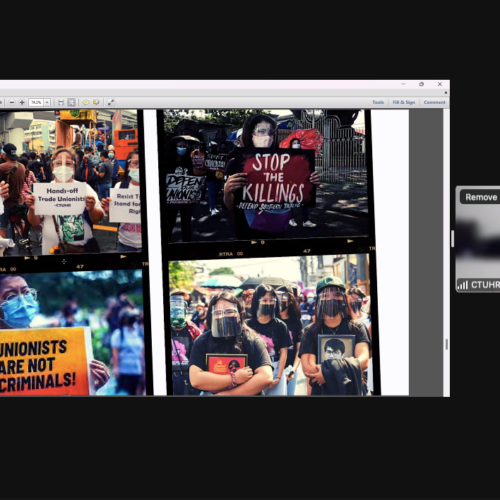
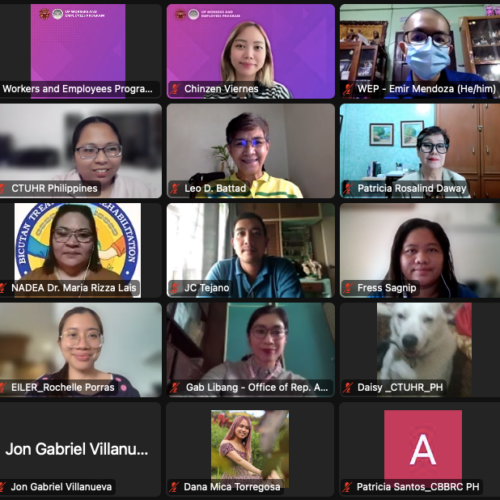
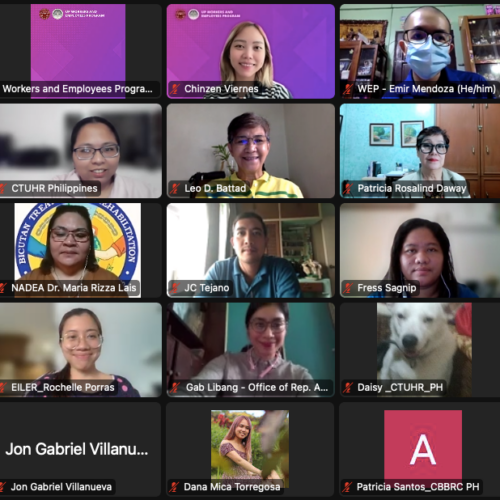
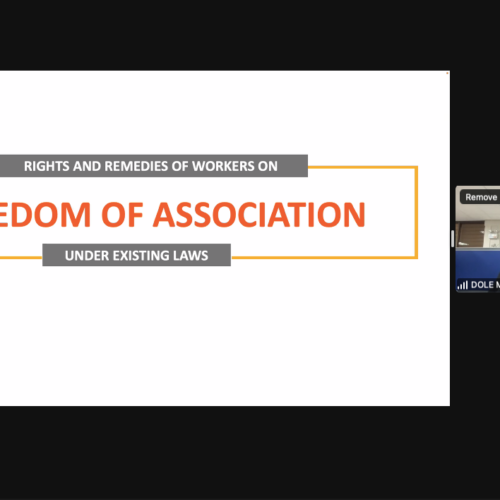
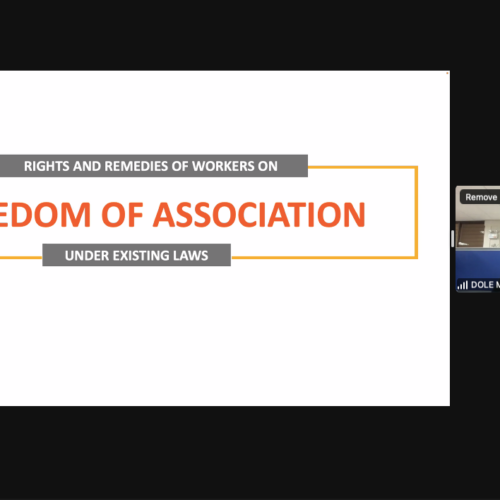
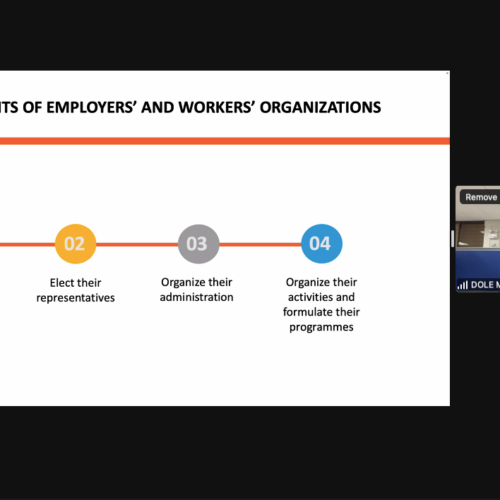
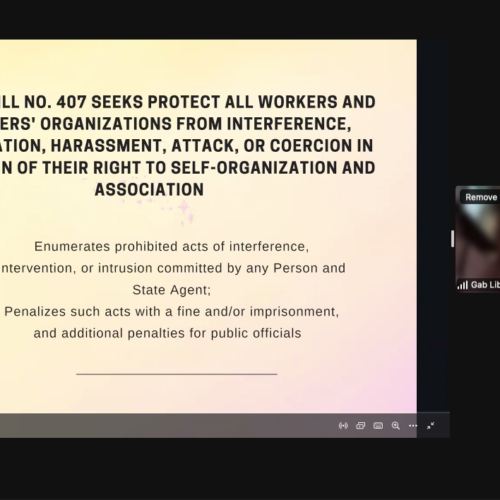
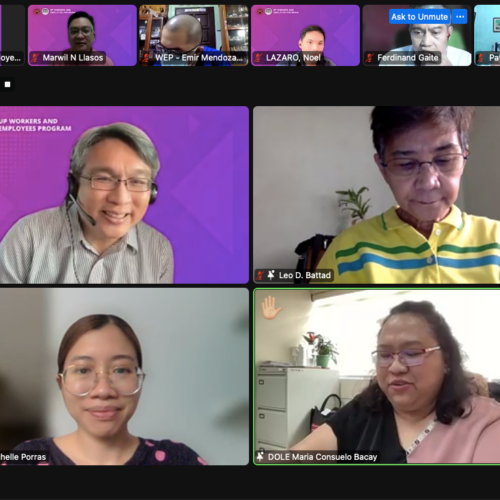
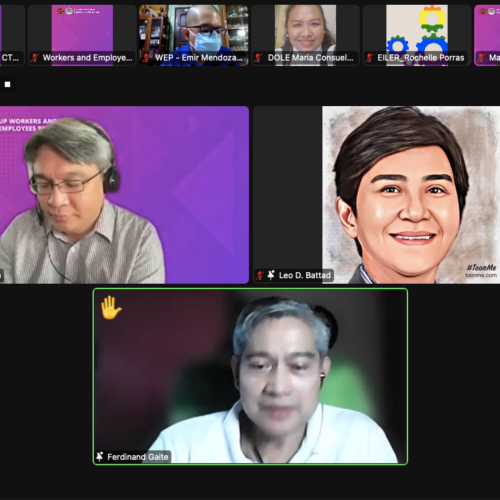
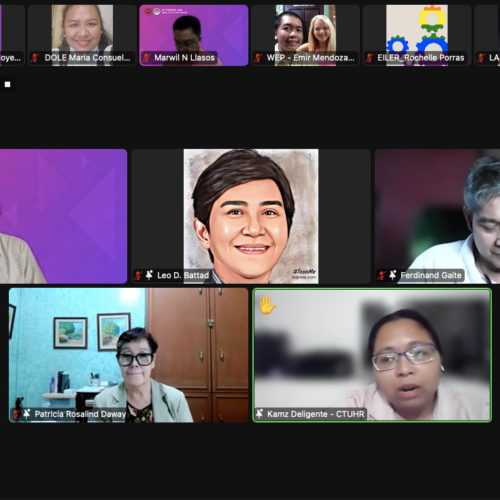
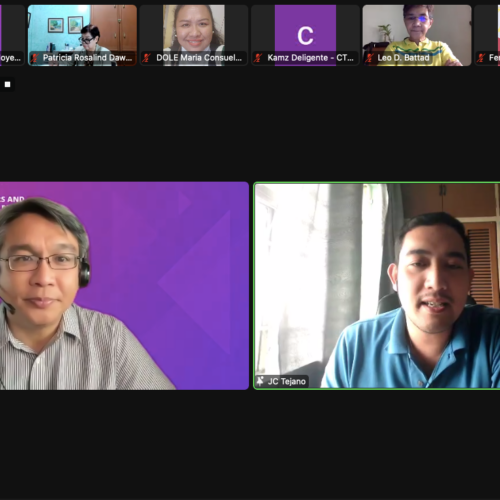
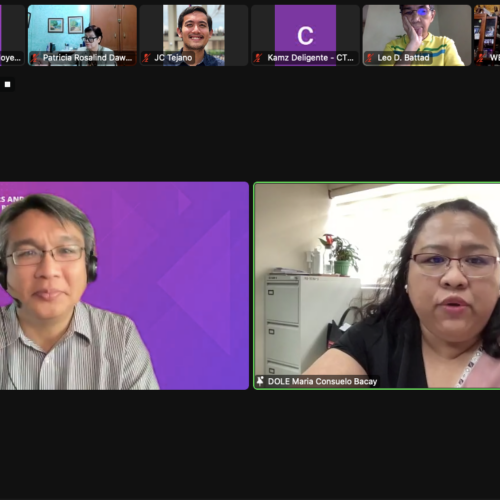
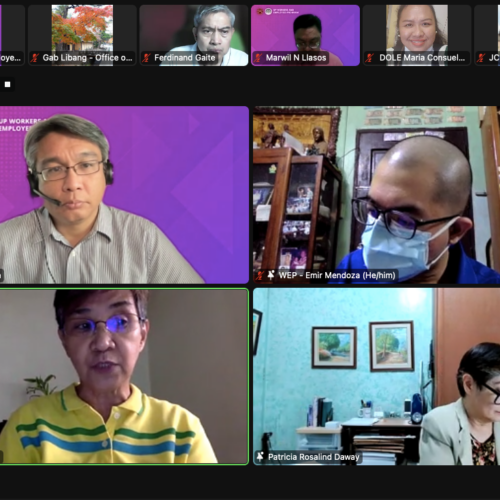
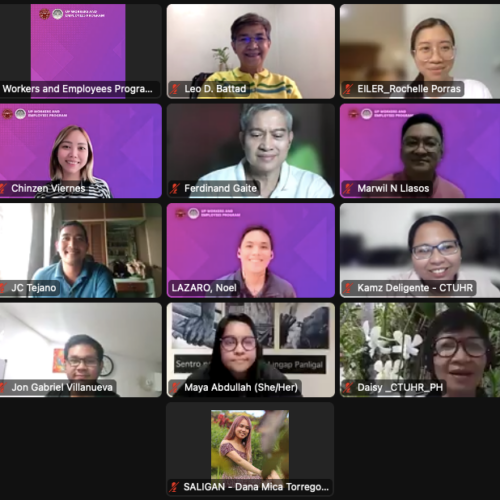
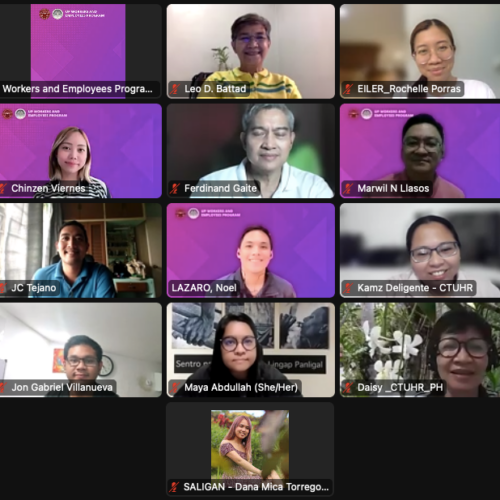






































































































 on the upper right corner to select a video.
on the upper right corner to select a video.